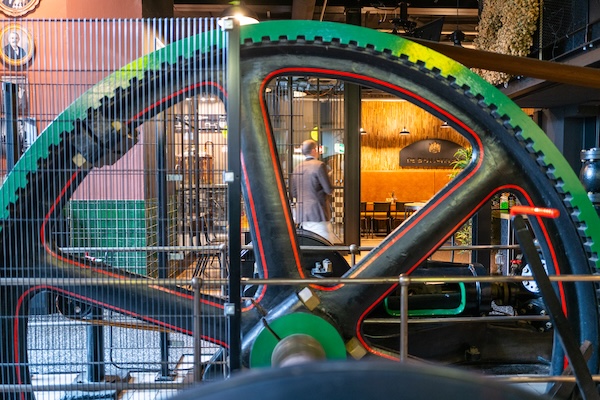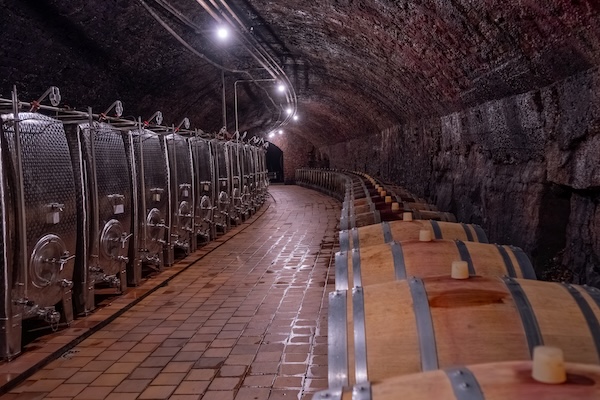 Brasserie Nationale (Bofferding & Battin), Bascharage;
Credit: Ali Sahib, Chronicle.lu
Brasserie Nationale (Bofferding & Battin), Bascharage;
Credit: Ali Sahib, Chronicle.lu
Luxembourg may be a small country, but it boasts a long-standing tradition of beverage craftsmanship, rooted in centuries-old winemaking in the Moselle Valley, local brewing customs and a growing number of artisan distilleries. The Grand Duchy’s unique geographical setting, coupled with its multicultural influences and deep agricultural ties, has shaped a diverse and evolving beverage industry.
While the Moselle region is internationally recognised for its white wines and crémants, Luxembourg is also home to a range of family-run breweries and modern craft beer producers, as well as distilleries that continue to produce fruit-based spirits using traditional methods. Together, they reflect both the country’s rural heritage and its growing taste for innovation in food and drink.
Winemaking in the Moselle Valley
Luxembourg’s winemaking tradition is most visible in the Moselle Valley, stretching from Schengen to Wasserbillig. The region’s slopes and microclimate are ideal for growing white grape varieties, particularly Riesling, Pinot Blanc, Auxerrois and Elbling. The country’s Appellation d’Origine Protégée – Moselle Luxembourgeoise ensures quality and regional authenticity.
Among the most prominent producers is Domaine Vinsmoselle, a cooperative of winegrowers with several cellars open to the public, located in Greiveldange, Remerschen and Wormeldange. Visitors can take part in tastings and cellar tours that offer insight into the region’s wine culture and production processes.
In addition to cooperative producers, Luxembourg is home to several independent wineries with strong reputations. Bernard-Massard, based in Grevenmacher, is the country's largest private producer of sparkling wine and a leading name in crémant production. The estate offers guided tours and tastings in its historic cellars overlooking the Moselle.
Further south, Caves St Martin in Remich is known for its extensive underground galleries carved into the limestone cliffs. The winery offers crémant and still wines and welcomes visitors year-round for tours and tastings.
Craft and Traditional Breweries
Beer brewing in Luxembourg has seen a resurgence in recent decades, with both historic breweries and newer craft ventures contributing to a diverse beer landscape. While industrial-scale brewing has declined since the early 20th century, several brands have remained household names and independent brewers have helped revive the sector.
One of the country’s most recognised breweries is Brasserie Nationale, producer of Bofferding and Battinbeers. Based in Bascharage, the brewery offers guided tours, a brewing museum and tastings that explore the science and tradition of Luxembourgish beer-making.
Brasserie Simon, established in Wiltz in 1824, is another long-standing brewery with a strong regional presence. It combines traditional methods with modern brewing techniques and has also launched a line of organic and craft-style beers.
In recent years, microbreweries such as Béierhaascht (Bascharage), Stuff Brauerei (Ettelbruck) and Totenhopfen Brauhaus (Luxembourg City) have gained popularity for their experimentation with hops, fermentation methods and bold flavours. Many offer seasonal specials and direct sales, along with brewery tours and events.
In addition to long-established names like Brasserie Nationale and Brasserie Simon, Luxembourg's beer heritage includes Brasserie de Luxembourg Mousel-Diekirch, a brand that traces its roots to the historic Mousel and Diekirch breweries. Today, it continues to produce beer under the Diekirch label and is widely known in both local and regional markets.
Distilleries and Spirits
Distillation also has deep roots in Luxembourg, particularly in the rural east and north, where fruit brandies (known locally as eaux-de-vie) have been made for generations. These clear spirits are typically distilled from plums, pears, apples and mirabelles.
Distillerie Diedenacker in Schengen and Pitz-Schweitzer in Holzem are two examples of family-run distilleries that combine craftsmanship with local produce. Many distillers in Luxembourg are part of the Confrérie du Goude Patt, a group dedicated to preserving traditional distillation methods.
More recently, Luxembourg has also joined the international trend of craft gin production, with small-batch distillers experimenting with local botanicals. Brands such as Gin Tonic Lëtzebuerg, Opyos and Edelobstbrennerei Streng reflect this new direction in Luxembourg’s spirit market.
In parallel with the rise of craft spirits, Luxembourg is also seeing renewed interest in cider production, with producers combining traditional apple varieties and modern brewing methods. Ramborn Cider Co, based in Born, has played a pioneering role in revitalising local orchards and helped introduce craft cider to Luxembourg and the Greater Region. Their range includes dry and semi-dry ciders, as well as seasonal varieties, all made from locally grown apples and pears. Ramborn also offers orchard tours and tasting sessions at their cidery.
 Caves St Martin, Remich; Credit: Ali Sahib, Chronicle.lu
Caves St Martin, Remich; Credit: Ali Sahib, Chronicle.lu








